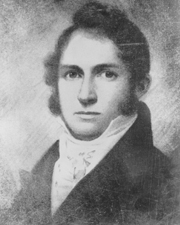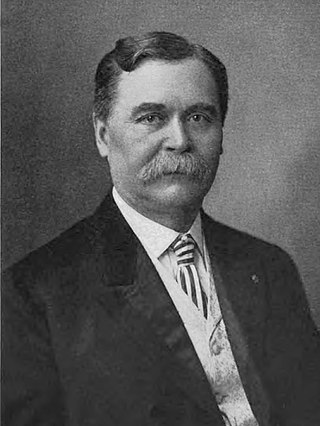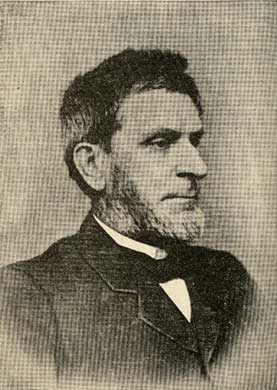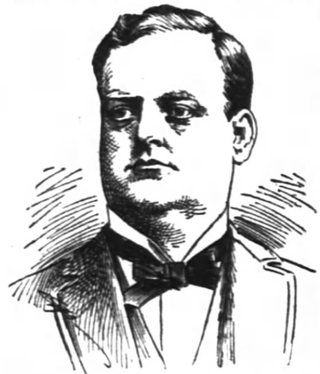Related Research Articles

Thomas Corwin,also known as Tom Corwin,The Wagon Boy,and Black Tom was a politician from the state of Ohio. He represented Ohio in both houses of Congress and served as the 15th governor of Ohio and the 20th Secretary of the Treasury. After affiliating with the Whig Party,he joined the Republican Party in the 1850s. Corwin is best known for his sponsorship of the proposed Corwin Amendment,which was presented in an unsuccessful attempt to avoid the oncoming American Civil War.

Shelby Moore Cullom was a U.S. political figure,serving in various offices,including the United States House of Representatives,the United States Senate and the 17th Governor of Illinois. He was Illinois's longest serving senator.

John McLean was a United States representative and a Senator from Illinois. He was the brother of Finis McLean and uncle of James David Walker.

Daniel Pope Cook was a politician,lawyer and newspaper publisher from the U.S. state of Illinois. An anti-slavery advocate,he was the state's first attorney general,and then became a congressman. He is the namesake of Cook County,Illinois.

William Hendricks was a Democratic-Republican member of the House of Representatives from 1816 to 1822,the third governor of Indiana from 1822 to 1825,and an Anti-Jacksonian member of the U.S. Senate from 1825 to 1837. He led much of his family into politics and founded one of the largest political families in Indiana. He was the uncle of Thomas Andrews Hendricks,who was also Governor of Indiana and Vice President of the United States. Hendricks County was named in his honor. His term as governor was spent repairing the state's finances to later enable large scale internal improvements. The establishment of the basic framework of the state's public school system and the transfer of the capital from Corydon to Indianapolis also occurred during his term.

John Marshall Hamilton was the 18th Governor of Illinois,serving from 1883 to 1885. Born in Union County,Ohio,Hamilton became interested in politics at a young age,joining the Wide Awakes when he was thirteen and the Union Army four years later. After graduating from Ohio Wesleyan University he studied law and was admitted to the bar. A notable attorney in Bloomington,Illinois,Hamilton was elected to the Illinois Senate in 1876. He served there until 1881,when he was elected Lieutenant Governor of Illinois on a ticket with Shelby Moore Cullom. When Cullom resigned after election to the United States Senate,Hamilton became Governor of Illinois. He was not selected as a candidate for re-election,but did serve that year as a delegate to the 1884 Republican National Convention. He spent the rest of his life as an attorney in Chicago,where he died in 1905.

Joseph Wilson Fifer was the 19th governor of Illinois,serving from 1889 to 1893. He also served as a member of the Illinois Senate from 1881 to 1883.

Elbert Leroy Lampson was a notable figure in Ohio politics and public affairs during the second half of the nineteenth century. Hailing from Jefferson,Lampson was the 21st lieutenant governor of Ohio and former State Senator. A lawyer by profession,his time had been taken up with a diversity of interests. He was a banker,and for many years was a newspaper publisher.

Rufus Paine Spalding was a nineteenth-century politician,lawyer and judge from Ohio. From 1863 to 1869,he served three terms in the U.S. House of Representatives. He also served as a justice of the Ohio Supreme Court from 1849 through 1852 and as a member of the Ohio House of Representatives from 1839 through 1842.

Henry Snapp was a U.S. Representative from Illinois. He was the father of Howard Malcolm Snapp,also a U.S. Representative.

Isaac Funk was an American rancher and politician,originally from Kentucky. In the 1820s,he founded Funks Grove,Illinois,in McLean County,Illinois,with his brother and became a prominent cattle trader. Funk was elected to one term in the Illinois House of Representatives in 1840. Despite several financial setbacks,Funk remained one of the wealthiest settlers in the area. He served in the Illinois Senate in the 1860s and died before his second term was complete. He was the patriarch of the Funk family and co-founded Illinois Wesleyan University.

John Whitnah Leedy was the 14th Governor of Kansas,serving 1896 to 1898. He later was active in politics in Alaska and Alberta,Canada.
The Funk Family is composed of Midwestern United States pioneers who did business in the fields of agriculture,politics,finance and civic life. Abraham Lincoln was one of Funk Farms' first attorneys and later served in the Illinois House of Representatives with Isaac Funk,who was a friend of Lincoln's and a booster when Lincoln ran for president. Funk and Lincoln were also responsible for bringing the Chicago &Alton Railroad through Bloomington-Normal in McLean County,detouring it from its originally planned route through Peoria.
John Moore,nicknamed "Honest John",was an English American politician who served as Lieutenant Governor of Illinois. He also served in the Mexican–American War as lieutenant colonel and 9th Illinois State Treasurer.

Ejliah Middlebrook Haines was an American politician and author. Born in New York,he came to Illinois with his brother John Charles and established one of the first villages in Lake County,Hainesville. Admitted to the bar in 1851,Haines wrote several notable law books. He was first elected to the Illinois House of Representatives in 1858 and served eight intermittent terms,including two as Speaker of the House. Staunchly independent after 1865,Haines was a leader in the movement against the Republican Party in Illinois before his death in 1889.
George Washington Funk was an American rancher and politician from Illinois. The son of prominent state politician Isaac Funk,and a member of the Funk family,George W. Funk was tasked with dividing his father's vast holdings upon his death. Although he held similar political beliefs as his father,he was only elected to office once:to the Illinois House of Representatives in 1870 to a two-year term.

Marquis De LaFayette Funk (1834-1911),commonly known as Lafayette Funk,was an American politician and rancher from Illinois. A son of Isaac Funk,Funk graduated from Ohio Wesleyan University and helped manage his father's farm. When his father died,Funk managed his inheritance. Funk was elected to the Illinois House of Representatives in 1882,then filled Joseph W. Fifer's seat in the Illinois Senate the following year. He was re-elected to the senate in 1886. Funk also served two years as a trustee of the University of Illinois.

William James Campbell was an American attorney and politician in Illinois. From Pennsylvania,he came with his parents to southern Cook County,Illinois at a young age. Campbell attended public schools,then the University of Pennsylvania and the Union Law School. He co-founded Campbell &Custer,a prominent law firm that represented industries. He served in the Illinois Senate from 1878 to 1886,quickly rising to become its president. From 1883 to 1885,this made him acting Lieutenant Governor of Illinois. After his Senate experience,he returned to his law firm and was a member of the Republican National Committee.

John Dougherty was an American politician from Ohio. After a stint mining and teaching,Dougherty became an understudy of Alexander Pope Field and was admitted to the bar. He served several terms in both the Illinois House of Representatives and the Illinois Senate over the next twenty years. In 1868,he was elected Lieutenant Governor of Illinois.

Sue A. Sanders was an American teacher,clubwoman,and author,who was prominent in charities and social circles. She served as national president of the Woman's Relief Corps,auxiliary to the Grand Army of the Republic,the largest charitable organization in the world in its day. She has the credit of being the originator of placing a flag in every school house,hers the first school to have a flag in McLean County,Illinois. The legislature changed the plan to putting it on the outside,which law was later repealed. She was the author of A journey to on and from the "golden shore" (1887).
References
- 1 2 Duis, E. (1874). The Good Old Times in McLean County, Illinois. Bloomington, IL: The Leader Publishing and Printing House. pp. 505–509.